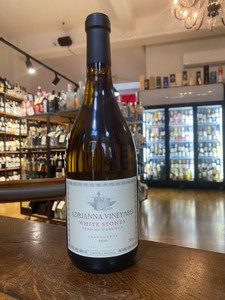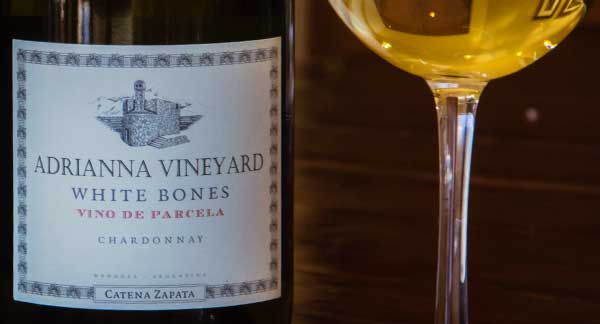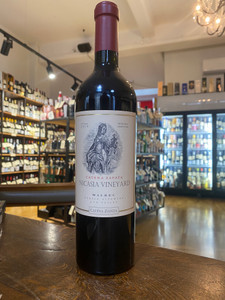
WINE DESCRIPTION
For over four generations, the Catena family has grown vines in the foothills of the Andes Mountains in Mendoza, Argentina. In his pursuit to make wines that stand with the best in the world, Nicolás Catena identified the best lots and rows, in the Catena family’s estate vineyards.
The Adrianna vineyard is located at almost 5,000’ elevation in the Gualtallary sub-district of the Tupungato region. White Bones Chardonnay comes from select rows within Block 1 of the Adrianna Vineyard. The name refers to the soil underneath these rows, which is layered with calcareous deposits and limestone as well as fossilized animal bones - remnants of a river that used to pass through the region.
There are many theories about why the grapes coming from these rows have such distinctive floral aromatics with an earthy minerality in the nose and palate. It may be related to the minerals in the soil or to the effects that the calcareous deposits have on root penetration.
At this extreme high altitude, the nights are cool, only a few degrees above freezing even in the summer. The night-day temperature difference is between 15 and 20 degrees. And the sunlight is more intense because of the altitude.
TECHNICAL INFORMATION
- Varietal: 100% Chardonnay
- Alcohol: 12.6%
- Total Acidity: 8.1 grams/liter
- pH: 3.2
- 500 lts foudres
- Wild yeasts
- Unfined and unfiltered

VINEYARD
- Adrianna Vineyard: Gualtallary District, Tupungato Alto Region, Uco Valley, Mendoza, Argentina
- Parcel Name: White Bones
- Parcel Surface: 2,2 Hectares
- Soil composition: Alluvial origin. Calcareous soil
- Altitude: 4.757 ft (1.450 m) elevation
WINEMAKING AND AGING
Cold settling for 12 hours in stainless steel tanks at 6º C. Fermentation in French oak barrels for 45 - 95 days at 16°C. Battonage. Partial malolactic fermentation. Aged for 12-16 months in 2nd, 3d and 4th use French oak barrels.
The Producer
"Nicolás Catena Zapata is justly credited with putting Argentinean wines on the world map—by the best expedient of focusing entirely on quality. It's great to know he has started a wine dynasty, too."
Jancis Robinson, Financial Times wine journalist
"Nicolás Catena Zapata is a man of vision, of high intellect, always curious about others and about how the world is developing. He has been instrumental in changing the Argentinian wine scene more than anybody else, pushing it towards high quality."Baron Eric de Rothschild, Château Lafite
When the Catenas decided to experiment with a new terroir at high altitude, they entered a world dominated by the long-held French theory that quality depends mostly on terroir. According to the French, the human factor—whether the winemaker or the vineyard manager—is inconsequential. Quality only depends on nature, climate, and the type of soil where the vineyard is planted. There is nothing that the winemaker can do if the quality does not come from the place where the vineyard is located: the terroir.
In trying to implement this French theory in Argentina several years ago, the Catenas made a startling discovery: The alluvial soils from Mendoza are not homogenous. In other words, in the same vineyard, within short distances, there are both physical and chemical soil differences, resulting in vineyard lots or parcelas with unique characteristics. As a result, each vineyard lot gives origin to its own unique wine with very specific flavors and aromas. This discovery prompted the family to drill down even deeper into the theory of terroir.

Dr. Laura Catena, a biologist who graduated with honors from Harvard University, decided to instill in the winery team the method of research and study, what she calls "the science of understanding nature."
With the help of Catena's Head Winemaker Alejandro Vigil, Fernando Buscema, Catena Institute of Wine Director, and Vineyard Manager Luis Reginato, Laura created the Catena Institute of Wine. Since then, the Catenas have conducted strong research aimed at getting a better understanding of the Argentine terroir, the characteristics of Mendoza, and to study every aspect of their vineyards with the ultimate goal of making Argentine wines that can stand with the best of the world. The Catena's first successful project using research as a guide was with Chardonnay.





